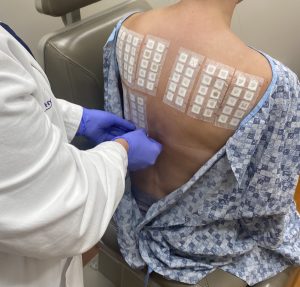- Home
- Blog
- Medical Dermatology
- Patch testing: A crucial tool for dermatologists in assessing allergic contact dermatitis
Patch testing: A crucial tool for dermatologists in assessing allergic contact dermatitis
 As skin care providers, it’s essential for us to excel in diagnosing and managing allergic contact dermatitis (ACD) – a common skin condition that affects many people. Fortunately, patch testing is a valuable method that help us pinpoint the allergens responsible for triggering ACD. At SkinCare Physicians we regularly use patch testing to diagnose patients suffering from skin rashes. In this post, Katie Brodt, one of our Nurse Practitioners and an expert in patch testing, will explain ACD and walk you through the patch test process.
As skin care providers, it’s essential for us to excel in diagnosing and managing allergic contact dermatitis (ACD) – a common skin condition that affects many people. Fortunately, patch testing is a valuable method that help us pinpoint the allergens responsible for triggering ACD. At SkinCare Physicians we regularly use patch testing to diagnose patients suffering from skin rashes. In this post, Katie Brodt, one of our Nurse Practitioners and an expert in patch testing, will explain ACD and walk you through the patch test process.
Understanding allergic contact dermatitis (ACD)
ACD occurs when the skin comes into contact with substances capable of inducing an immune response in susceptible individuals. Common allergens that can cause an allergic reaction include fragrances, preservatives, metals, and various chemicals found in personal care products, cosmetics, and industrial materials. Identifying the specific allergen(s) is crucial for effective management and prevention of ACD recurrence.
The role of patch testing
Patch testing is a diagnostic method specifically designed to detect allergens responsible for ACD. By applying a series of standardized allergens to the patient’s skin, we can determine which substances elicit a delayed hypersensitivity skin reaction. This information enables us to develop personalized treatment plans, including avoidance strategies and allergen-specific immunotherapy.
The patch test process
- Patient screening: We carefully select patients suspected of having ACD based on their medical history, symptoms, and absence of active skin conditions that might interfere with the test’s interpretation.
- Patch test panels: Our providers use standardized patch test panels that include a wide range of common allergens. The panels contain 98 substances, some of which may be related to the patient’s job, hobbies, and relevant exposures.
- Patch application: We carefully apply patches containing small amounts of allergen substances to the patient’s upper back using proper techniques. We ensure careful adherence to patch placement and timing protocols.
- Reading and interpretation: After 48 hours, patients return to our office so that we can remove the patches and evaluate the skin for any initial positive reactions. A final reading at one week follows as allergic reactions may develop slowly. We then interpret the results based on standardized scoring systems for consistency and accuracy.
Personalized allergen avoidance
Identifying the specific allergens enables us to guide you on avoiding exposure to the substances that trigger your allergic skin reaction. We will also recommend alternative skincare products or offer advice on adjusting work practices to help you significantly reduce the risk of ACD flare-ups. Additionally, we will create a profile for you on the Skinsafe Products website where we will input your specific allergens, helping you find “safe” products to buy and use.
If you find yourself suffering from an allergic skin reaction, know that we can help you diagnose the cause of your rash. Consider making an appointment with one of the experienced providers at SkinCare Physicians to see if you are a candidate for patch testing.



I get hives all over my body. I take Benadryl and have tried numerous over the counter products allegra, claratin, etc. I am not using anything new- shampoos cologne laundry soap etc. nothing has changed. Not even foods. I think my body is getting used to these meds. I have used numerous itch creams but they are no longer working. I am so miserable.
Hives are a complex and sometimes tricky condition to deal with. We are happy to meet with you in office for a detailed evaluation or schedule an appointment with your physician.